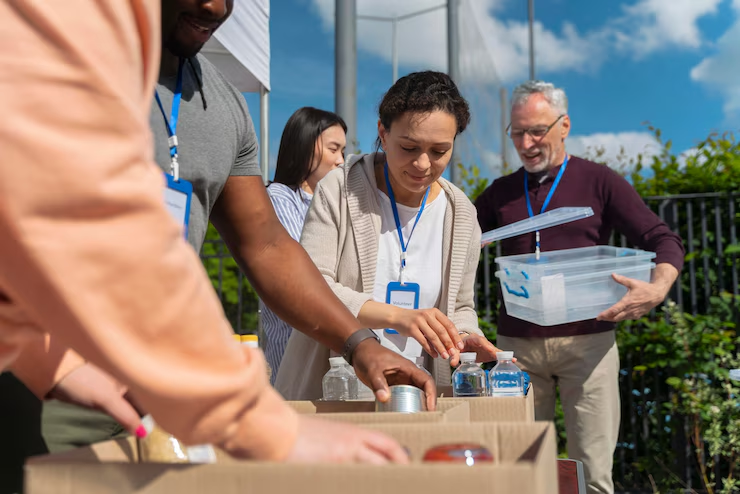Volunteering with non-profit organisations is a fulfilling way to give back to society, especially by working with elderly community groups. These groups, central to many non-profits, rely on dedicated volunteers to thrive. Volunteers provide crucial emotional, physical, and social support, helping the elderly overcome isolation and declining health.
Understanding the Importance of Volunteering for the Elderly
Many elderly individuals face isolation, loneliness, and sometimes depression as they age. Volunteering at non-profit organisations that support elderly community groups is key to offering them much-needed support. Volunteers participate in activities that enhance the quality of life for seniors, including providing companionship, organising recreational activities, and assisting with everyday tasks.
These interactions help elderly individuals feel valued and connected to others. Non-profit organisations also provide training, ensuring volunteers are equipped to support the elderly effectively and make a meaningful impact.
Non-Profit Organisation Jobs and Their Impact on Elderly Groups
Non-profit organisation jobs aim to improve the lives of vulnerable individuals. Volunteers working with elderly groups may manage activities, assist with mobility, offer administrative support, and even provide basic healthcare. While these tasks may seem small, they significantly contribute to the well-being of seniors.
Volunteers play an essential role in creating an inclusive society by supporting community groups for the elderly. Their work fosters connections and helps ensure older people aren’t left behind. Non-profit roles span caregiving, management, and social services, offering volunteers diverse ways to contribute based on their skills and interests.
Key Benefits of Volunteering for the Elderly
Volunteering in elderly community groups provides a host of benefits for both the volunteers and the elderly individuals they serve. Below are the key advantages of such involvement:
- Reduces loneliness for the elderly: Regular interaction with volunteers can combat feelings of isolation.
- Enhances their sense of purpose: Volunteering helps elderly individuals feel that they are valued members of society.
- Gives access to more community resources: Volunteers connect the elderly with essential community services.
- Improves overall well-being: Social engagement and activities organised by volunteers can positively impact the physical and mental health of elderly individuals.
Volunteering offers volunteers personal growth, skill development, and a sense of fulfilment. It fosters empathy, creates supportive networks, and helps build stronger, more connected communities. Volunteers make a meaningful impact on the elderly community’s well-being.
Why Community Groups for the Elderly Need Volunteers
Elderly community groups provide a space where older individuals can come together, socialise, and engage in meaningful activities. These groups rely heavily on the support of volunteers to function effectively. Here are some reasons why elderly community groups need volunteers:
- Volunteers bring energy, dedication, and skills: Volunteers are crucial in providing the drive and expertise needed to run activities for the elderly.
- They ensure the smooth operation of events and activities: Without volunteers, many activities such as exercise classes, arts and crafts sessions, and social events would not be possible.
- Help maintain community connections for the elderly: Volunteers help seniors stay connected with others, reducing isolation and fostering a sense of belonging.
- Provide essential support in areas like mobility, transportation, and social activities: Volunteers assist the elderly with everyday tasks, making it easier for them to participate in community events.
Community groups for the elderly are essential for seniors’ well-being, but they rely on volunteers for support. Volunteers provide practical help and emotional care, enabling elderly individuals to live more independently and feel connected to their community.
How to Get Involved in Volunteering for Elderly Groups
If you are considering volunteering with non-profit organisations supporting elderly community groups, here are some simple steps to follow:
- Identify local non-profit organisations focused on elderly care: Many of these organisations are always looking for volunteers, whether for short-term projects or ongoing roles.
- Explore flexible volunteer opportunities: Whether you want to give a few hours a week or take on a more substantial role, there are plenty of opportunities to get involved.
- Understand specific needs of elderly community groups: Each group may require different kinds of assistance, so it’s essential to understand how your skills can best be used.
- Look for organisations offering training and support: Many non-profits offer training to ensure their volunteers are equipped with the necessary knowledge to work effectively with the elderly.
Volunteering for elderly groups can be an enriching and rewarding experience. By giving your time and skills, you not only make a direct impact on the lives of elderly individuals but also contribute to building a more inclusive society.
Conclusion
Volunteering with non-profit organisations supporting elderly community groups is a meaningful way to make a difference. Volunteers reduce loneliness, promote inclusion, and offer vital support, helping seniors stay active and engaged. Non-profit organisation jobs in this area provide various roles for impactful contributions.
Volunteering connects, supports, and empowers elderly individuals, helping them maintain independence and dignity in their later years.
